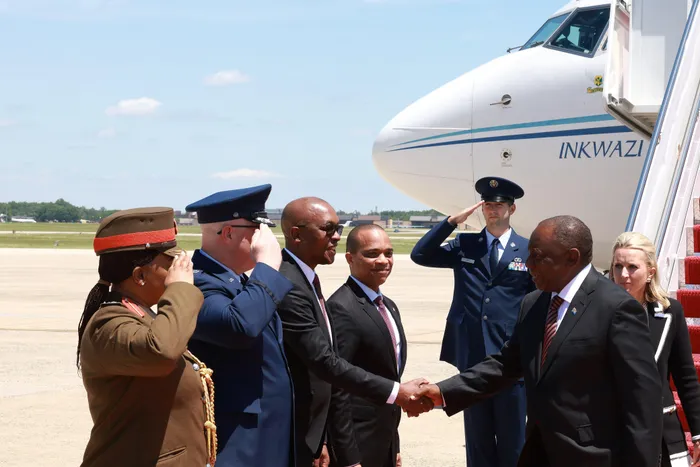
Experts say President Cyril Ramaphosa and US President Donald Trump are unlikely to have a bilateral meeting during the upcoming 80th United Nations General Assembly (UNGA)
Image: File/GCIS
Experts believe that although President Cyril Ramaphosa and US President Donald Trump are unlikely to meet directly, the 80th United Nations General Assembly (UNGA) meeting in New York comes at a crucial time for South Africa and the US to address their bilateral relations.
Trump imposed a 30% tariff on imports from South Africa recently after Ramaphosa’s government made several unsuccessful attempts to secure a trade agreement.
The tariff rate is the highest in Sub-Saharan Africa and could cause tens of thousands of job losses at a time when South Africa’s economy is barely growing and unemployment is stuck above 30%.
Trump’s decision was based on several factors, including the US trade deficit with South Africa and political disagreements with its government. The new tariffs effectively ended South Africa’s duty-free access to the US market, which it had previously enjoyed under the African Growth and Opportunity Act (AGOA).
Trump also accused South Africa of “white genocide”, mistreatment of white minority and unfair land policies. These claims, amplified by allies such as Elon Musk, escalated tensions between the US and South Africa.
Ramaphosa, who arrived in New York to lead a South African delegation at UNGA, is also expected to engage with the private sector during the Trade and Investment Executive Dialogue hosted by the Department of Trade, Industry and Competition in collaboration with the US Chamber of Commerce, on the margins of UNGA.
He is also set to meet with several leading US companies as part of an investment drive.
This comes after Trade Minister Parks Tau and the US Trade Representative Jamieson Greer reached an agreement on a roadmap that will inform future engagements towards the conclusion of the trade deal between the two countries during a meeting that was held on Friday.
International relations expert Dr Muhluri Nkuna said the UN meeting also offers an opportunity for diplomatic officials to have closed door meetings.
Nkuna said that with Trump playing his cards close to his chest on the South African issue, it is unlikely that Ramaphosa will be able to discuss the matter with him, adding that Solidarity and AfriForum’s visit to the US will not help. Both Solidarity and AfriForum announced that they have dispatched a delegation to the US to advocate for South Africa, its economy and its working population.
“Even Minister Ronald Lamola was dissatisfied with this conduct. This demonstrates how the sovereignty of South Africa has been undermined by the likes of AfriForum, among others. I don’t think Ramaphosa and Trump will meet even behind closed doors to discuss this.
"The representatives or diplomatic officials and envoys that are entrusted will deliberate on issues and report to their Presidency,” he said, adding these representatives are also expected to discuss how to decode the misinformation that was propelled about South Africa’s economic policies and white genocide.
Tau’s spokesperson Kaamli Alli refused to divulge details of the meeting, saying that an agreement on a roadmap for a trade deal has been reached and they are working on negotiations based on a document that the US has sent.
“We are hoping to return the document within the coming weeks with our commentary. We can expect high level engagements on the need to enhance trade and investment between the two countries and to discuss trade related matters with the private sector,’’ said Alli.
Another international relations expert, Dr Noluthando Phungula, said it is not a secret that the US is increasingly interested in the country’s minerals as the sector remains stifled by the complexities of trying to reach the US market.
She added that AGOA will also remain an important discussion point and that removing South Africa from the agreement would be both pointless and counterproductive.
"AGOA offers a clear well-defined roadmap to track and evaluate the commercial processes throughout Africa. It then becomes important for the country to position itself within AGOA. The importance of harnessing AGOA remains crucial for SA’s industrial development, job creation, and inclusive growth in Africa,’’ she said.
“Identifying high-demand products in the US market and focusing on exporting those products can help boost economic growth,” said Phungula.
“More realistically, both nation states benefit from bilateral trade relations. SA remains a strategic partner for the US and we cannot downplay the importance of the bilateral trade relationship between the two states. More than 600 American companies currently operate in South Africa, while over 22 South African firms have a presence in the US.”
Cape Times